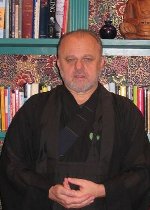Home » Literature Archives » Words and Eternal Mysteries
WORDS AND ETERNAL MYSTERIES
by Abbot John
After my State of the Union message, which I begin to think, is becoming an annual duty like taking down the screens, a few people wrote to me about the word "prandial" that I had used. Their spell checks had rejected it and accordingly, they doubted the word's existence. I naturally fell to musing about words, my life being what it is.
My spell check, I recalled, had rejected it, too. But then my spell check mysteriously rejects twenty percent of the words I use. It's particularly hostile in communicating about religious experiences but it also gets nasty in my business correspondence. "Vicissitudes" was the last alien word I used which caused a business associate to complain. He said that he suspected it was a word I made-up to disguise my true meaning. It was not, he asserted, in his spell check (and mine either until I added it). I decided to question our addiction to our machines and the place we have raised them to. I then fell to musing, the result of which was that I stumbled into the discovery that there are about 13 to 19 thousand words in the typical spell checker; and as everyone is aware, even after a hearty prandial, there are more words in the English language that are dreamt of in Horacio's vocabulary. I responded to his complaint by cavalierly noting that in the English language when we get the urge to disguise something or maybe show off, we resort to Latin... or some other dead tongue, maybe even French, pardon moi.
So to the query about the provenance of "prandial" I consulted a rarely used paper dictionary and saw that it meant exactly what I intended it to mean: "after dinner," from the latin prandium meaning "late breakfast." I will muse about that on another occasion.
There is a name (Latin of course) for what my associates accuse me of doing which I can't recall off hand, but I think it is called creating "neologisms". Skeptic materialistic philosophers always throw it about when they try to debunk metaphysical talk. It means something like creating a name for an experience and defining it in a non-testable manner, "God" probably being the best example. It goes straight to the point that the Buddha often made, but with considerably more dignity: be careful about words. They only represent states of being or things. Don't assign to a word its referent reality
Because words so often get us into such trouble arguing about definitions, disguising truth, showing off, and conducting an assortment of undesirable activities, I'll repeat the old Zen story that illustrates the problem best:
There was once a man who went to a foreign country in which, he observed, everyone seemed inordinately happy despite the obvious fact that they were not members of his own religion. Ripe for conversion, he found a holy man who spoke his own language. He asked him what god the people worshipped that inspired them to live such good and gentle lives.
"The people call Him ‘Moon,'" said the holy man.
"Ah," said the foreigner, savoring the strange word. "Where can I find this "Moon" so that I may go and worship Him, too."
The holy man, looked heavenward, and seeing the pale orb in the blue sky, he raised his hand and pointed. The foreigner immediately dropped to his knees and said, "Oh, Moon. Oh, Moon with soft pink cuticle and gracefully curved nail..."
More times than we would like to admit, our problems in sanghas, in families, in life and of course with the Dharma itself come from this fundamental error of mistaking the moon for the finger pointing at it, or vice versa.
Yes, the use of words is important in the continuance of the Dharma; but words are not the Dharma. They can bring a person a long way - but not all the way. They can spike an interest or curiosity of sorts to explore; but it must be remembered that they are a creation of the discriminating mind - a creation that is only one of the tools it uses to communicate with other discriminating minds - the very minds, or mind types, that have to be left behind as the insight revealed by the meaning illuminates the deeper source of consciousness. It is in the final realization of Noble Wisdom, as the Buddha put it, that we find the intuitive realization of truth.
I'll leave you with one of the most hopeful statements I've read that issued from the Buddha's mind: "Your mortal mind needs and uses words as your body needs and uses food. It takes the world as its support and it will always do so. But words are but words. You must experience the "turning about" (the deep experiential intuitive strike) and remember that intuition comes from the Tathagatas. It is they, not the world, that provide your support as you move in Noble Wisdom and advance towards their buddha-land domains."
There is something of deep religion, faith, and hope in that statement, yet words are but words and in this age after you have struck your bell's clear tone don't despair if you think none hear it. The sound is not for this world's ears, but those that have other ears will hear it.

